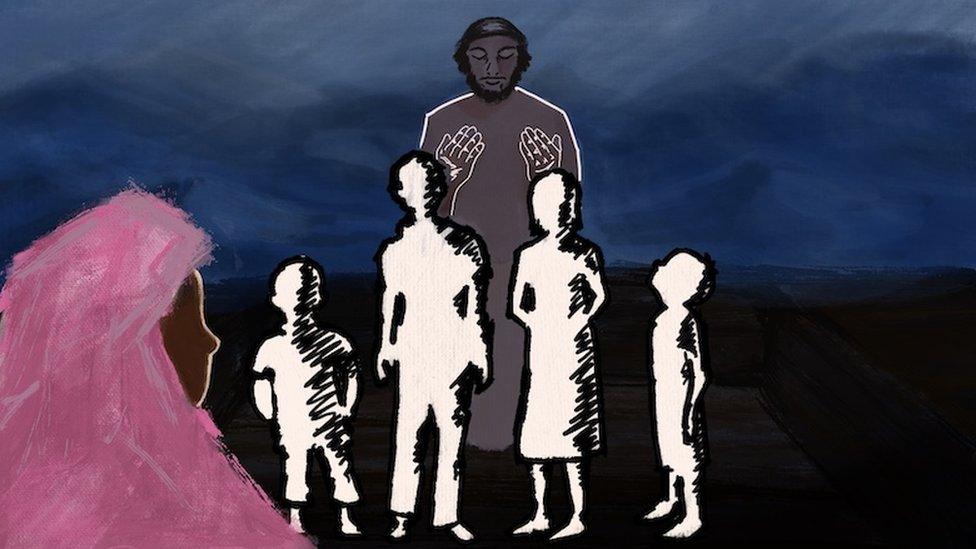Cox's Bazar fire: ‘I wanted to save them even if I died doing so’
- Published
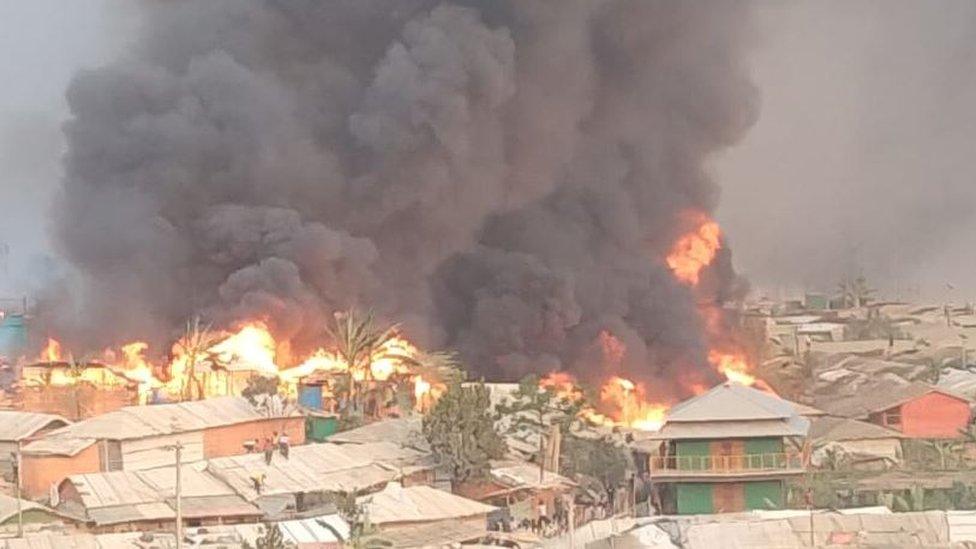
An enormous fire has spread through a Rohingya camp in Cox's Bazar, Bangladesh. The UN's refugee agency says 45,000 people have been displaced, at least 15 have died and 400 remain unaccounted for.
As the fire engulfed thousands of makeshift shelters, Saiful Arakani, a 25-year-old refugee, ran straight into the toxic smoke to help find survivors.
"People were turning to ashes in front of my eyes," Saiful said.
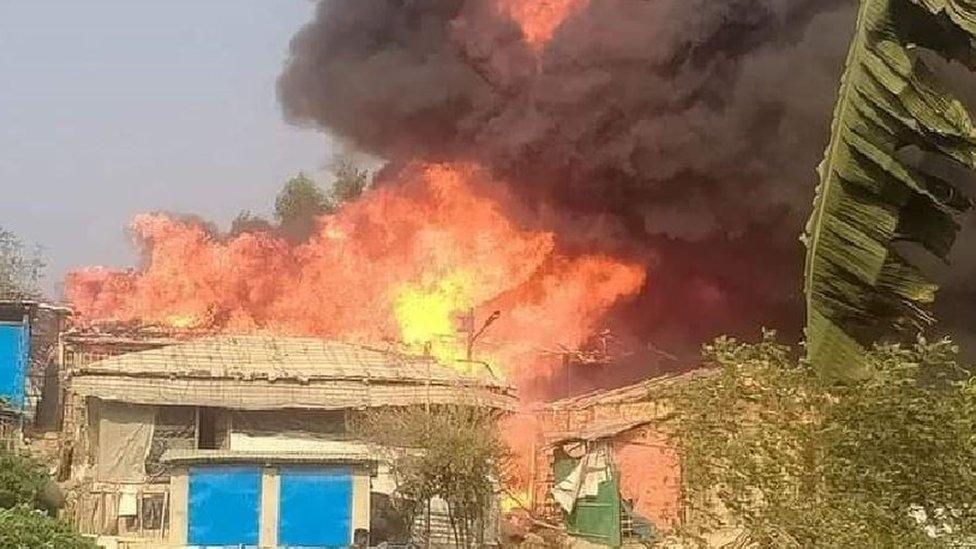
The UN refugee agency say 10,000 shelters have been destroyed
Along with several other volunteers, Saiful used his jacket and blankets to help save those being badly burned by the fire. Saiful, a professional photographer, was only carrying his phone but he managed to grab snapshots of the chaos and destruction.
"I started taking pictures but I couldn't stop crying," he said.
Of all of the photographs he took, the most shocking captured the badly burned body of a toddler. The boy's remains lay next to a small toy, tucked closely into his tummy.
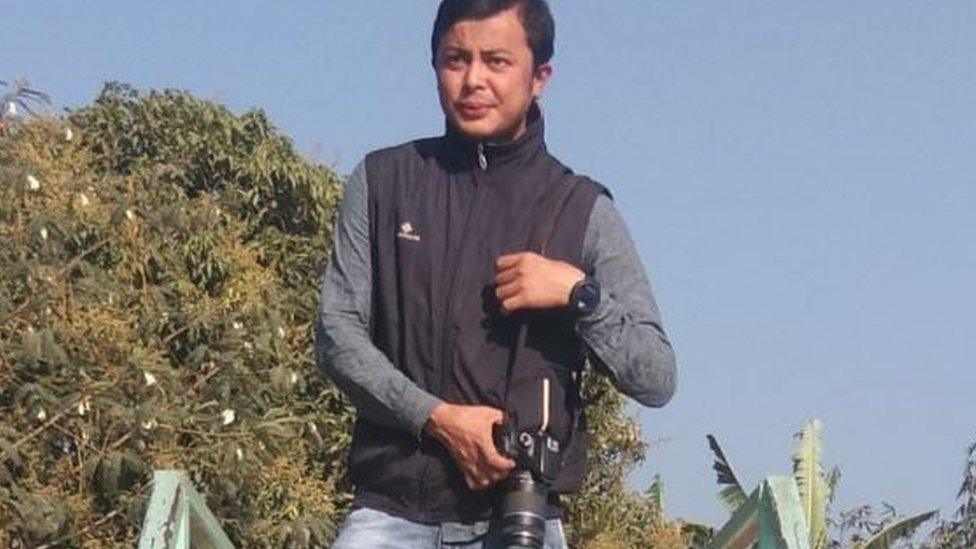
25-year-old Saiful Arakani is a professional photographer and lead volunteer in the camp
Home to an estimated one million ethnic Rohingya, Cox's Bazar, in south-east Bangladesh, contains 34 neighbouring camps. Tens of thousands of Rohingya fled their homeland in Myanmar after a brutal crackdown in 2017.
But with thousands of makeshift homes packed so tightly into hilly terrain, once the fire took hold in Kutalapalong Balukhali camp, it spread quickly through several others, bringing a swath of devastation.
For Saiful, it was the middle of the afternoon when his mother, stepping out of their front door, saw the huge rolling billows of black smoke and yellow flames more than 2km (just over a mile) away.
"The flames were reaching more than 100 feet (30m) into the air," he said. "I immediately took a taxi and rushed to the site of the fire."
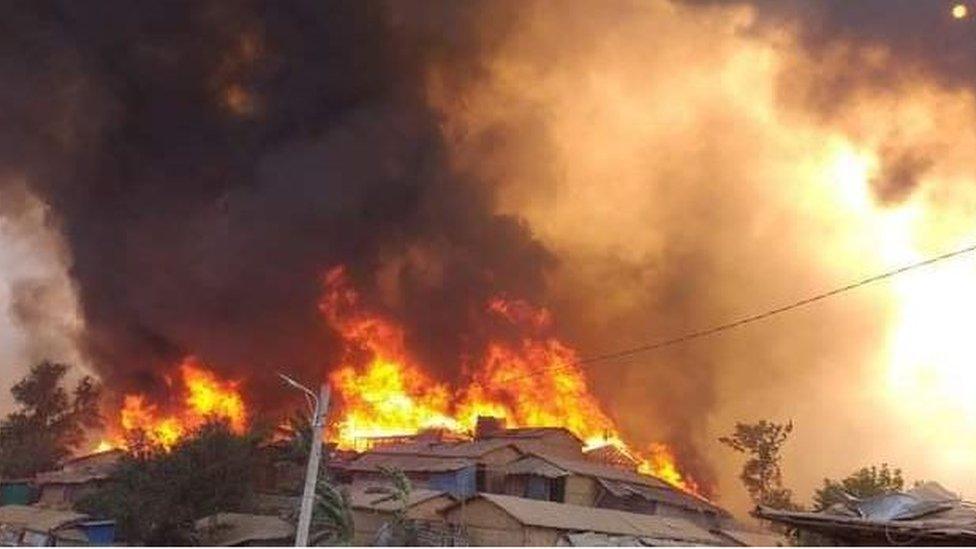
Local resident Saiful and his friends arrived at this location long before the fire brigade were able to help
By the time he arrived, a crowd had gathered. Many were trying desperately to guess in which direction the fire would move through the camp.
"I saw people fleeing their homes screaming, 'Save my mother, save my sister.' It was complete chaos. No-one knew what to do," said Saiful.
With the emergency services still some distance away, together with a small group of residents, the photographer headed into the toxic smoke and began looking for survivors.
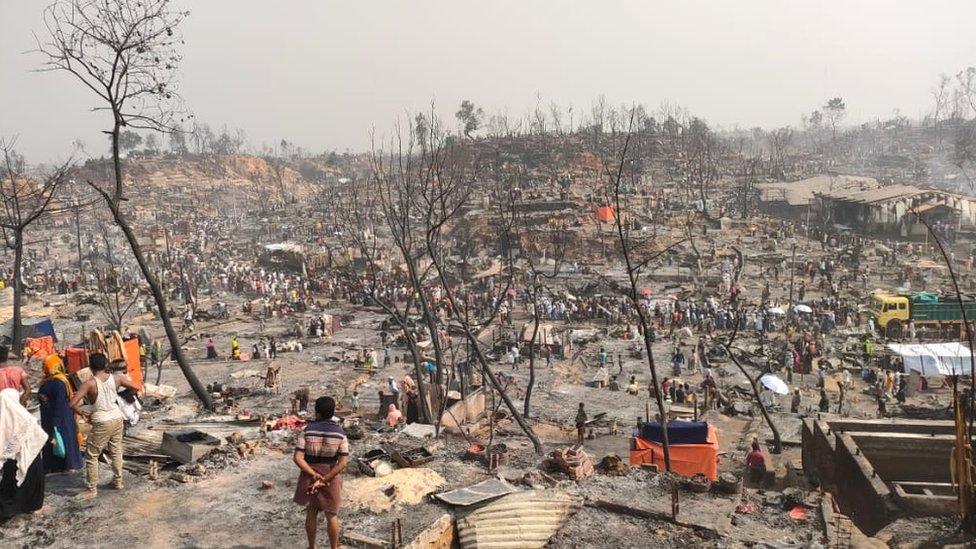
Aid agencies say the extent of the devastation is still being assessed
What he witnessed next he would never forget, Saiful said.
"I saw people like me turning to ashes. I wanted to help them. I wanted to save them, even if I died doing so. I carried babies, old women and men, all in my arms and over my shoulders. Many of them were seriously injured."
During the chaos, he heard one man screaming for help.
"His name was Saleem. He must have been around 40 years old. He was crying, "Please save my daughter and my wife. I am alive but please save my daughter." Clambering through the wreckage, the volunteers managed to pull the man's family members free, saving both their lives.
After living in the camps for more than four years, Saiful says he knows all too well what it's like to feel abandoned.
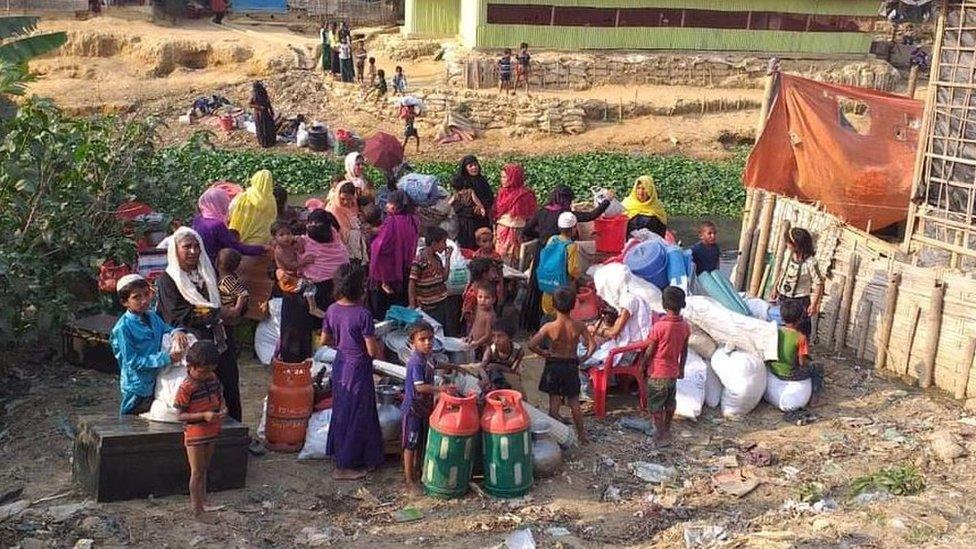
Saiful says hundreds of people were rescued by the volunteers
For the emergency services, with almost 60,000 people crammed into every square kilometre, just getting to the site of the fire was difficult. With no piped water system in that part of the camp, Saiful described how for over an hour, a small army of fellow refugees rushed back and forth with buckets of water. Finally, around 4.30pm local time, the fire engines arrived.
As several ambulances also pulled up, Saiful began helping aboard those he'd rescued. He knew at least one person he pulled from the fire later died in hospital due to their injuries, he said.
"Ten people died in front of me. Four were young children, aged between one and six."
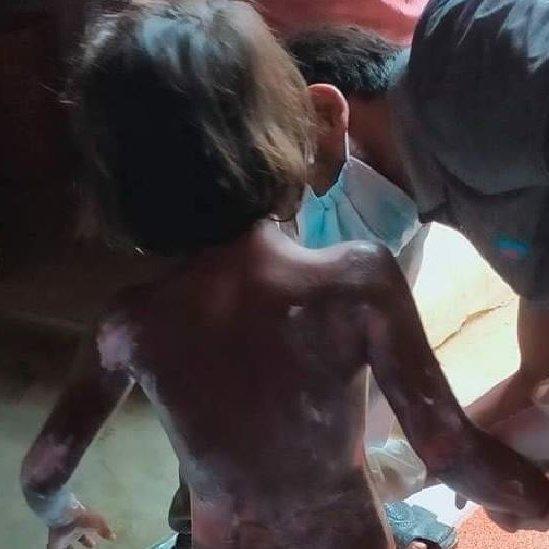
A young girl being treated for burns after being pulled from the fire
By sunset, with the fire largely under control, many aid agencies began to address the needs of those who had lost everything.
According to the UN's refugee agency, roughly 560 people have been injured and approximately 45,000 people have been displaced. With around 10,000 shelters destroyed, ActionAid Bangladesh's country director Farah Kabir told the BBC they are already starting to receive those who have been left homeless.
"We have accommodated 200 survivors along with a number of unaccompanied children in two community centres," he said. "We have distributed dry food. In coordination with the camp in-charge (CIC) we have also distributed 12,000 litres of drinking water."
For Saiful, there was scant comfort as night fell in the fact that he had helped people to safety.
"I doubt I'll sleep tonight," he said. "The cries of those young children and helpless women are still echoing in my head. I just wish I could have saved more people."
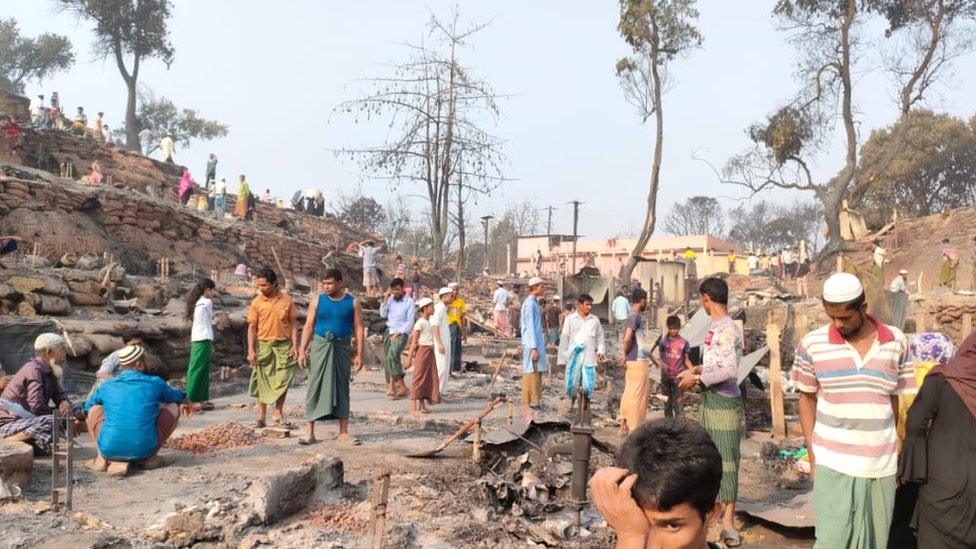
The community look at where their homes once stood
Related topics
- Published23 January 2020
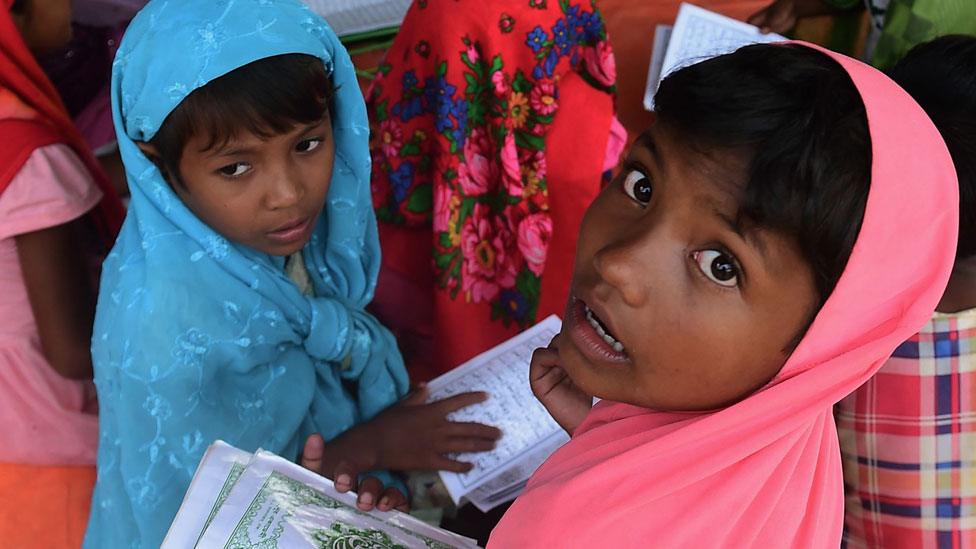
- Published29 May 2020
